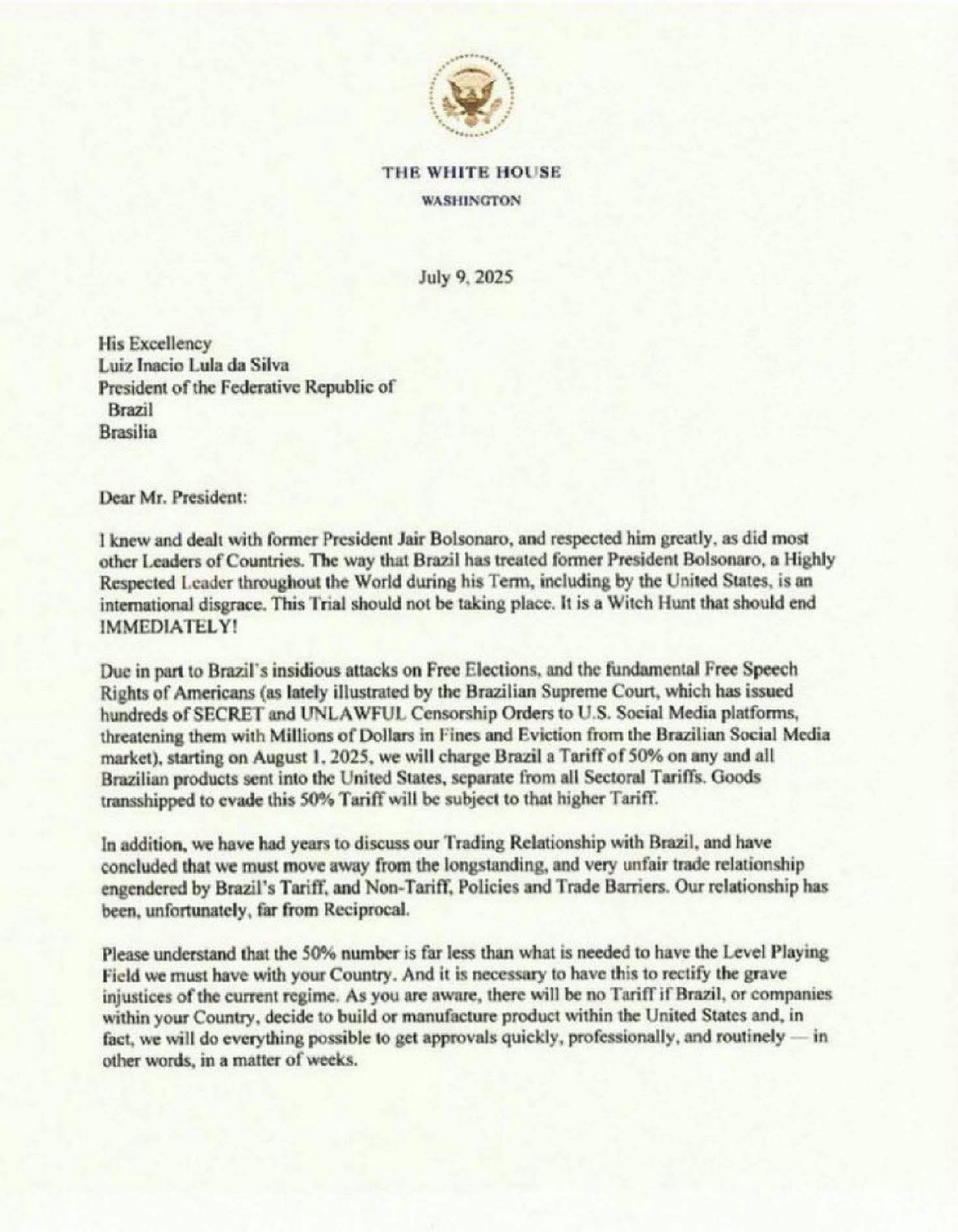Introduction
On July 9, 2025, a letter surfaced from the White House addressed to Brazilian President Luiz Inácio Lula da Silva. The letter expressed sharp disapproval of Brazil’s legal proceedings against former President Jair Bolsonaro, describing the trial as a “witch hunt” and an “international disgrace.” Moreover, the U.S. government threatened economic retaliation through a 50% tariff on imports, citing Brazil's alleged censorship practices and imbalanced trade policies.
This letter marks a significant diplomatic and geopolitical flashpoint that combines international trade policy with ideological conflict over free speech and political trials. The proposed tariffs and accusations could have profound implications not only for U.S.-Brazil relations but also for global norms regarding sovereignty, judicial independence, and trade equity.
Analysis of the Letter's Content
1. Political Interference in Judicial Matters
The most contentious aspect of the letter is the U.S. President's interference in Brazil’s judicial affairs. Jair Bolsonaro's trial in Brazil concerns election subversion and possible involvement in anti-democratic actions. The United States condemning this as a "witch hunt" crosses the traditional boundary of respecting another nation's judicial independence. By advocating for the termination of legal proceedings in a sovereign nation, the U.S. risks appearing to support impunity for political elites, especially when those elites align ideologically with certain factions in American politics.
2. Free Speech and Censorship Concerns
The letter accuses Brazil's Supreme Court of violating American companies' rights by issuing "unlawful censorship orders" against U.S.-based social media platforms. This ties into ongoing global debates about the role of tech giants, national jurisdiction over internet content, and the definition of free speech in the digital age. Brazil, like many countries, has taken steps to regulate misinformation and political extremism on platforms like Twitter (X) and Facebook, especially in the wake of violent unrest. However, labelling these regulatory moves as "insidious attacks on Free Elections" reflects an ideological lens rather than an objective legal analysis.
Trade Policy Implementation: Implications of the 50% Tariff
1. Economic Impact
Imposing a 50% tariff on Brazilian goods—especially outside existing World Trade Organisation (WTO) frameworks—would significantly impact trade flows. Brazil is a major exporter of agricultural products, minerals, and industrial goods to the U.S. Such a move could:
Spark a trade war, with Brazil retaliating with its own tariffs.
Disrupt global supply chains, particularly in food, energy, and aviation sectors.
Increase costs for U.S. consumers and businesses reliant on Brazilian imports.
2. Violation of International Trade Norms
Unilaterally imposing a punitive tariff on another country for domestic political reasons could violate WTO rules. The U.S. justifying such a move under the banner of "Level Playing Field" and free speech rights sets a controversial precedent. It politicises trade policy and could encourage other nations to bypass multilateral rules in favour of unilateral retaliation.
3. Weaponisation of Trade
The letter implies that U.S. companies will be rewarded or punished based on whether they invest in countries that align with U.S. values, particularly free and independent judicial behaviour. This is a form of economic statecraft, but it risks politicising global commerce and undermining investor confidence. Multinationals may feel caught between conflicting laws in different jurisdictions, leading to regulatory uncertainty.
Geopolitical and Diplomatic Consequences
1. Polarisation in the Americas
This move could further polarise Latin American politics, aligning conservative governments with U.S. interests while alienating left-leaning administrations like Brazil's. It may also undermine regional cooperation in climate change, migration, and anti-narcotics enforcement.
2. Damage to U.S. Credibility
Lecturing a democratic nation like Brazil—primarily when it actively prosecutes those accused of anti-democratic actions—could harm America's reputation as a supporter of democracy and the rule of law. If perceived as hypocritical or ideologically selective, U.S. influence may wane among neutral or Global South countries.
Conclusion and Recommendations
The July 9, 2025, letter reflects a dangerous entanglement of foreign policy, domestic politics, and ideological alignment. It risks undermining judicial sovereignty, disrupting trade, and escalating tensions in the Western Hemisphere.
Instead of imposing punitive tariffs, the U.S. should:
Engage Brazil diplomatically and multilaterally through international institutions like the WTO and OAS.
Encourage dialogue around digital regulation and social media responsibilities.
Promote fair trade through reciprocal negotiations, not unilateral threats.
Economic coercion and political interference will only deepen mistrust and global instability in a world increasingly divided along ideological lines. Brazil and the U.S. must tread carefully to preserve democracy, international law, and mutual economic prosperity.

No comments:
Post a Comment